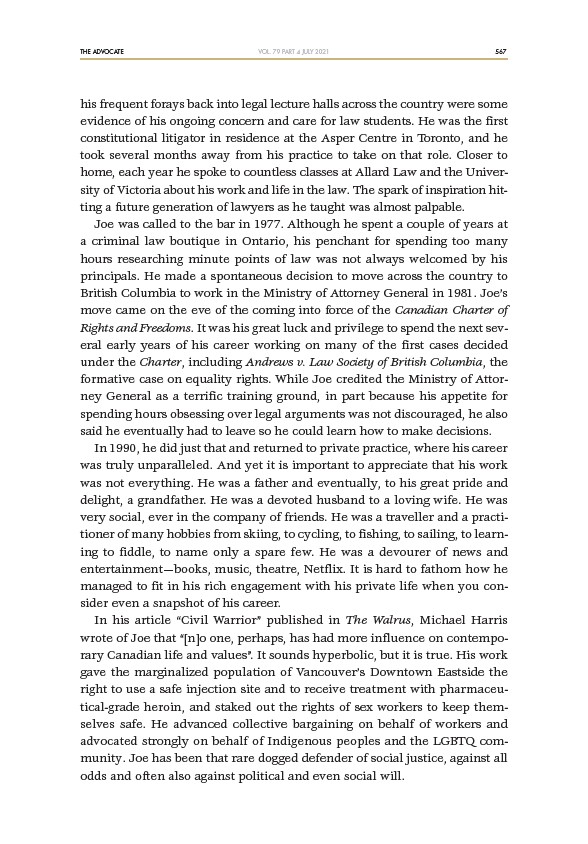
THE ADVOCATE 567
VOL. 79 PART 4 JULY 2021
his frequent forays back into legal lecture halls across the country were some
evidence of his ongoing concern and care for law students. He was the first
constitutional litigator in residence at the Asper Centre in Toronto, and he
took several months away from his practice to take on that role. Closer to
home, each year he spoke to countless classes at Allard Law and the University
of Victoria about his work and life in the law. The spark of inspiration hitting
a future generation of lawyers as he taught was almost palpable.
Joe was called to the bar in 1977. Although he spent a couple of years at
a criminal law boutique in Ontario, his penchant for spending too many
hours researching minute points of law was not always welcomed by his
principals. He made a spontaneous decision to move across the country to
British Columbia to work in the Ministry of Attorney General in 1981. Joe’s
move came on the eve of the coming into force of the Canadian Charter of
Rights and Freedoms. It was his great luck and privilege to spend the next several
early years of his career working on many of the first cases decided
under the Charter, including Andrews v. Law Society of British Columbia, the
formative case on equality rights. While Joe credited the Ministry of Attorney
General as a terrific training ground, in part because his appetite for
spending hours obsessing over legal arguments was not discouraged, he also
said he eventually had to leave so he could learn how to make decisions.
In 1990, he did just that and returned to private practice, where his career
was truly unparalleled. And yet it is important to appreciate that his work
was not everything. He was a father and eventually, to his great pride and
delight, a grandfather. He was a devoted husband to a loving wife. He was
very social, ever in the company of friends. He was a traveller and a practitioner
of many hobbies from skiing, to cycling, to fishing, to sailing, to learning
to fiddle, to name only a spare few. He was a devourer of news and
entertainment—books, music, theatre, Netflix. It is hard to fathom how he
managed to fit in his rich engagement with his private life when you consider
even a snapshot of his career.
In his article “Civil Warrior” published in The Walrus, Michael Harris
wrote of Joe that “no one, perhaps, has had more influence on contemporary
Canadian life and values”. It sounds hyperbolic, but it is true. His work
gave the marginalized population of Vancouver’s Downtown Eastside the
right to use a safe injection site and to receive treatment with pharmaceutical
grade heroin, and staked out the rights of sex workers to keep themselves
safe. He advanced collective bargaining on behalf of workers and
advocated strongly on behalf of Indigenous peoples and the LGBTQ community.
Joe has been that rare dogged defender of social justice, against all
odds and often also against political and even social will.